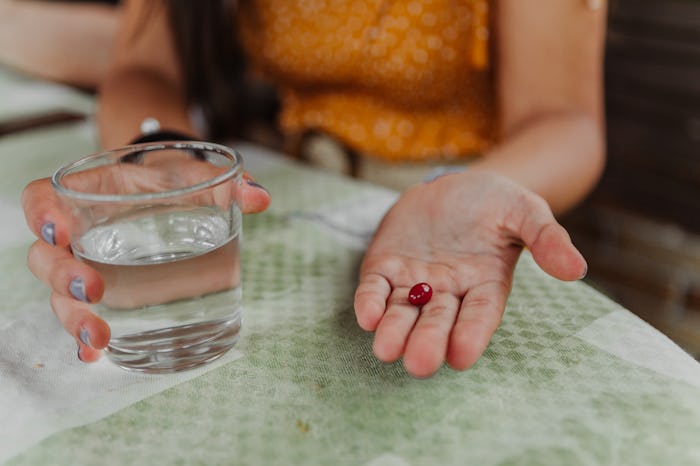Life

Should You Take Folic Acid When Trying To Get Pregnant? Experts Explain
Trying to conceive can be a potentially stressful time. There's so much information out there, and it's easy to be overwhelmed with everything from the positions you should try, the timing of sex, and even your diet and supplements. A lot of people trying to get pregnant even start some pregnancy supplements ahead of time, like prenatal vitamins. But should you take folic acid when trying to get pregnant? It seems to be a buzzword that gets thrown around a lot in TTC groups, but is it necessary?
OB-GYN Dr. Sherry Ross tells Romper you should start taking prenatal vitamins three months before you’re hoping to conceive to ensure you’re getting enough folic acid. “Prenatal vitamins should contain at least 400 mcg to 1 mg of folic acid to reduce the incidence of spinal defects — aka neural tube defects.” Ross says that a recent study showed women who took folic acid preconception also had a reduced incidence of autism.
However, reproductive endocrinologist Dr. Jaime Knopman tells Romper that taking extra folic acid is usually only required in very “select situations,” like women who had a prior pregnancy that was complicated by a neural tubal defect or women with seizure disorders. “For those patients we recommend taking extra folic acid,” she says. Otherwise, Knopman says, “I just try to tell my patients to be their best self, including trying to eat well, staying hydrated, getting exercise, getting adequate sleep, and taking a prenatal vitamin.”
Additionally, you’ll want to make sure you’re getting enough calcium, iron, vitamin A, vitamin B12 and vitamin D when TTC, according to Knopman. “A diet rich in fruits, vegetables, and a daily multivitamin are going to ensure that you and your fetus have all of the nutrition you need.”
The one vitamin you don’t want to get too much of when TTC is vitamin A. “High levels of vitamin A can be dangerous for a developing fetus. Therefore if a woman requires additional folic acid, we will recommend that she take additional folic acid and not double the prenatal vitamins.”
Other things you should limit when trying to get pregnant include limiting your intake of fish with high mercury levels “as mercury can also be toxic to a developing fetus,” per Knopman. “A good rule of thumb is to share everything you are taking — over-the-counter, prescribed, Eastern-based — with your OB-GYN. This will allow them to make a decision on what you can keep taking and what you must stop."
Just remember, there's no magic food or supplement to get you pregnant. "If an embryo is going to stick and become a fetus, it will do that. If it doesn’t and you find yourself having recurrent miscarriages or many months without a pregnancy, it is probably a good idea to see the advice of a fertility specialist. There may be something more serious going on that needs to be evaluated," Knopman says.
Experts:
Sherry Ross, MD, OB-GYN and Women’s Health Expert at Providence Saint John’s Health Center in Santa Monica, California
Dr. Jaime Knopman, board-certified reproductive endocrinologist of CCRM Fertility